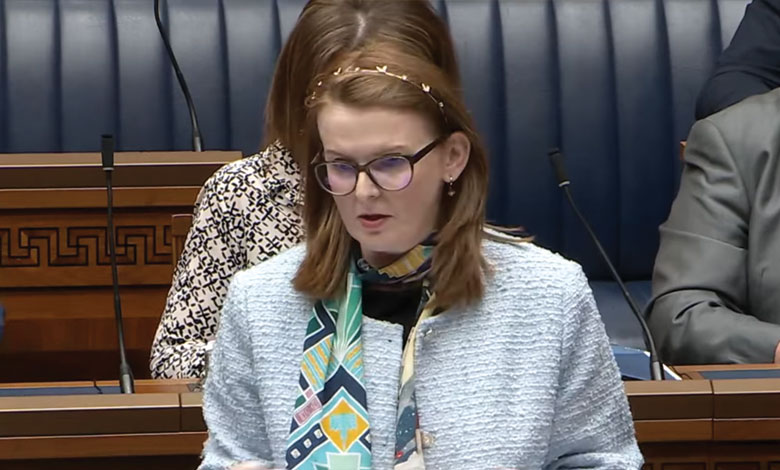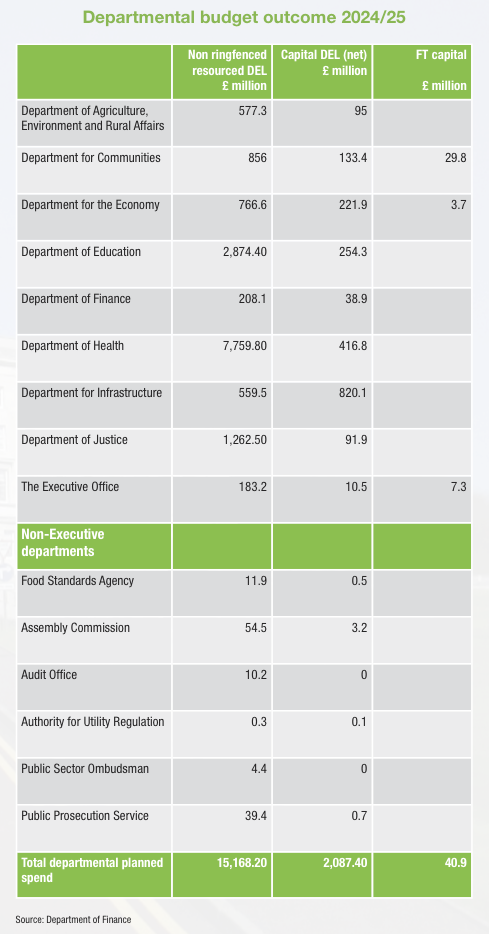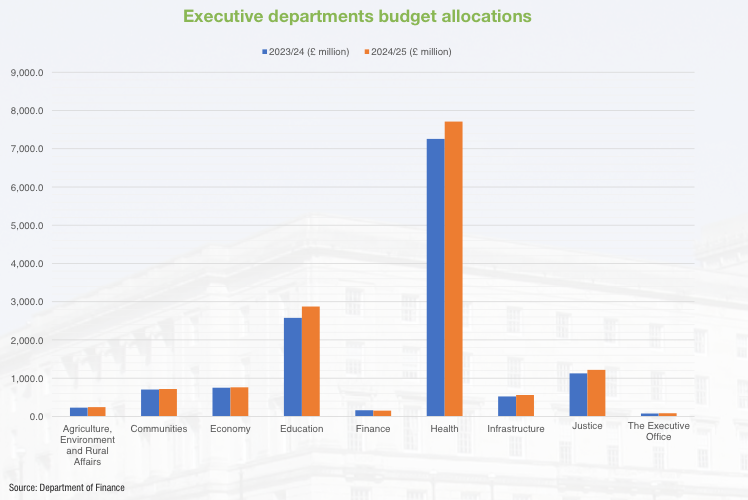
The first budget since the return of the Executive has resulted in political tensions between the four governing parties, with the Ulster Unionist Party even threatening to withdraw its one minister in the Executive. agendaNi examines the 2024 Executive Budget and its ramifications: both economic and political.
In total, the Department of Finance, with approval from the other parties in the Executive apart from the Ulster Unionist Party, has allocated £14.5 billion in day-to-day public spending (DEL) in Northern Ireland, with an allocation of £1.8 billion for capital spending.
Although the Ulster Unionist Party voted against it, the Budget is expected to go forward ahead of a vote on 28 May 2024 in the Assembly, where the support of Sinn Féin, the DUP, and Alliance is expected to see the Budget pass with at least 68 our of 90 MLAs in favour.
The Department of Health (DoH) has been granted almost a majority of public spending, with the DoH to be granted a day-to-day spending allocation of £7.76 billion, which in fact marks a £500 million increase on the previous year’s allocation, making the DoH the department to receive the largest boost in spending.
The next largest allocation of spending is significantly less than that to the Department of Health, with the Department of Education being granted a day-to-day spending allocation of £2.87
billion. The Department of Justice has been allocated £1.26 billion.
Although the Budget can be allocated in the context of an increase in funding by the British Government, the Finance Minister Caoimhe Archibald MLA has stated that “this has been a very challenging budget with funding requests from departments outweighing the funding available for allocation three times over for day-to-day funding (Resource DEL) and one and a half times for Capital DEL”.
Archibald added: “Undoubtedly, this has meant difficult decisions. Providing additional funding for one area means less funding for another. As an Executive, we have had to make tough choices and prioritise the funding envelope we have. The scale of the challenges facing us [will not] be fixed by one Budget.”
Allocations for the departmental resource budgets include:
- £7.76 billion: Department of Health
- £2.87 billion: Department of Education
- £1.26 billion: Department of Justice
- £856 million: Department for Communities
- £766.6 million: Department for the Economy
- £577.3 million: Department of Agriculture, Environment and Rural Affairs
- £559.5 million: Department for Infrastructure
- £208.1million: Department of Finance
- £183.2 million: The Executive Office

The capital allocations for the departments include:
- £820.1 million: Department for Infrastructure
- £416.8 million: Department of Health
- £254.3 million: Department of Education
- £221.9 million: Department for the Economy
- £133.4 million: Department for Communities
- £91.9 million: Department of Justice
- £95 million: Department of Agriculture, Environment and Rural Affairs
- £38.9 million: Department of Finance
- £10.5 million: The Executive Office
Asserting that “no department has received the level of funding it has bid for”, the Finance Minister has stated that she will be will be making the case to the British Government that more funding to ensure that the region is financed sustainably.
Meeting demand
The Block Grant in Northern Ireland was 40 per cent higher per head of population than equivalent UK Government spending as recently as 2018/19, but has been declining quickly compared to England. On 20 September 2023, the Secretary of State noted that “the Northern Ireland Executive receives around 20 per cent more per head than equivalent government spending in other parts of the UK”.
Prior to the 2022 collapse of the institutions, the Executive had been close to agreeing a multi-year budget and this remains an objective. However, longstanding challenges throughout many sectors – arguably most pressingly health and education – have led to this single-year budget as a stopgap.
The Budget can be characterised as bridging a gap, in that all of the political parties are dissatisfied with the outcomes owing to previous spending reductions by the UK Government which have contributed to worsening public finances.
The Windsor Framework states that the Executive should be introducing ‘austerity’ measures such as the introduction of water charges, raising tuition fees in line with the levels charged in England and Wales, and the privatisation of publicly owned institutions.
The UK Government, acting on advice from the NI Fiscal Council, has brought forward a fiscal floor which would mandate public spending in Northern Ireland to be £1.24 for every £1.00 spent in England. This proposal has received mixed reaction in Northern Ireland, with First Minister Michelle O’Neill MLA denying that revenue raising and servicing debt was part of the deal to return to Stormont.
The Northern Ireland Fiscal Council has estimated that Northern Ireland needs £1.24 per head for every £1.00 per head spent in England. Currently, Northern Ireland is estimated to have fallen below that level to about £1.20 per head.
Writing in agendaNi prior to the return of the Executive, Alliance deputy leader Stephen Farry MP argued that there is a need for a ‘fiscal floor’, and that this level should be £1.27 rather than £1.24.
Farry said: “Alliance is also concerned the 124 per cent measure may not be sufficient to adequately reflect our true underlying relative need.”
Servicing debt
As part of the return to Stormont, the Secretary of State Chris Heaton-Harris MP brought forward a £3.3 billion increase in funding from the UK Government, but overspends in previous Executives, and beyond that during the two-year absence of the Executive, have meant that a significant proportion of this money is being used to service overspends in this time.
£584 million of the offer to settle public sector pay claims, £34 million for tackling hospital waiting lists, and £15 million to help the Police Service of Northern Ireland (PSNI) with the impact of a major data breach.
Over the previous two financial years, the public overspend in Northern Ireland has amounted to an estimated £560 million.
The UK Government has agreed to pause debt repayments from 2022/23 and 2023/24 of up to £559 million to allow the Executive to stabilise services and begin implementing its plan to deliver sustainable finances.
It will no longer require these funds to be repaid if the Executive publishes a plan to deliver sustainable public finances and services by the end of summer 2024 and demonstrating implementation by May 2025.
However, the terms of the UK Government’s offer requires the Executive to “find” £113 million, a measure which is not in line with the measures outlined in the Budget.
In its assessment of the budget, the Northern Ireland Fiscal Council opines that “there is a medium-term budgetary cliff-edge facing the Executive” which “adds to the uncertain context in which current decisions are being made”.
On the conditionality of the Executive’s debt from historical overspends, the Fiscal Council states that there is a “difficulty” in meeting the conditions of meeting debt.
“The impact of having to repay the previous Reserve claims would be to bring forward the cliff edge by a year, into the 2025/26 fiscal year.”
Political fallout
In spite of the £500 million increase to the Department of Health, Minister Robin Swann MLA has threatened to walk out of the Executive, although he is already due to resign ahead of the next Westminster general election.
The Ulster Unionist Party was the only one of the four-party Executive to vote against the Budget, with Swann telling the Health Committee in April 2024 that “the Executive budget as it stands will make further industrial action in our health service all the more likely”. Swann denied before the Committee that he was “playing politics”.
Swann’s decision to vote against the budget was criticised by both the First Minister and the deputy First Minister.
Deputy First Minister Emma Little-Pengelly MLA said she understood Swann’s concerns but asserted that if he had received everything he asked for, “it would have consumed the entirety of what additional [funding] was available for the budget”.
SDLP Leader of the Opposition and chair of the Finance Committee Matthew O’Toole MLA has said that the Executive’s budget “fails to deliver meaningful change for people in Northern Ireland”.
“We knew that Northern Ireland is facing a tough budget settlement and the blame for that doesn’t lie solely at the feet of the Executive, but what was produced… shows no clarity around what the Executive’s priorities actually are and it is apparent they [the Executive] have no plan whatsoever for how we will rescue our failing public services,” O’Toole said.
The Budget has led to the unleashing of political tensions within an Executive which is under pressure from the opposition parties and civil society alike, and will do little to restore relations with a general election on the horizon.
Furthermore, the Executive has still not put in place a Programme for Government. With agreement for a new fiscal framework still facing a way to go, this Executive – which has passed little by the way of meaningful legislation in its first 100 days – faces an uphill task to provide funds for Northern Ireland’s ailing public finances.






